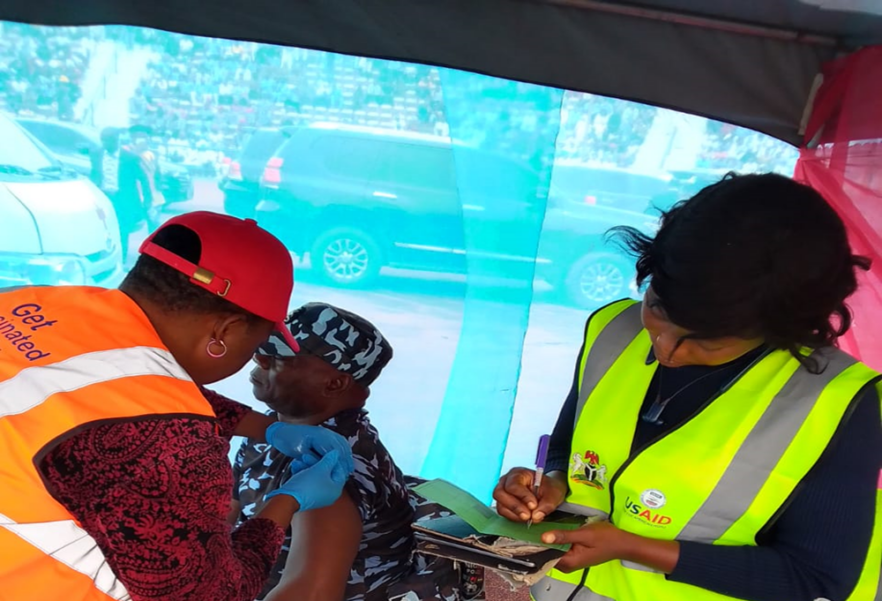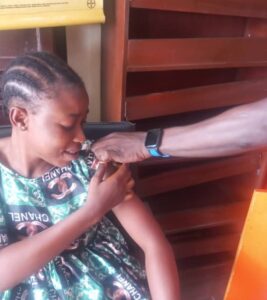Strategizing for Results: Mobilizing the Private Sector for COVID-19 Response in Nigeria
An interview with Doreen Enejoh

Nigeria was severely impacted by the COVID-19 pandemic, with over 266,000 confirmed cases in the country. With a population of over 200 million people, vaccinations needed to be delivered on a vast scale. The Government of Nigeria launched its national vaccination campaign in March 2021 to rapidly increase COVID-19 vaccination rates.
USAID MTaPS was a trusted partner in this campaign, thanks to its many years of experience in designing such interventions. The program played a key role in bringing the private sector on board, including community pharmacies, which had not previously been involved in vaccination strategies. This involvement proved to be life-saving. By the end of the project, over 120,000 people had received both the primary and booster doses of the COVID-19 vaccine from private facilities; more than 70,000 of these were delivered by community pharmacies.
Doreen Enejoh is the principal technical advisor for the MTaPS COVID-19 program in Nigeria. A pharmacist by training, she has over 24 years’ experience across the public sector, private sector, and international NGOs and holds a master’s degree in public health management. Doreen discusses MTaPS’ involvement in vaccine roll out in Nigeria, the key challenges and lessons learned, and why community pharmacies and other private-sector facilities were such valuable allies in this process.
Nigeria’s private sector had not previously been involved in a vaccination strategy, and there was no structure in place for them to do so. Why was the decision made to bring in the private sector and community pharmacies to support the COVID-19 vaccination roll out in Nigeria?
Doreen Enejoh: When the national COVID-19 vaccination strategy was set up, the private sector was not involved, the vaccination uptake rate was low, and the country urgently needed to achieve herd immunity. The national team discussed using new strategies to improve the visibility of the vaccine. This brought up the idea of bringing in the private sector, because in Nigeria, over 60% of the population accesses health care through the private sector.
There was a need to ensure the population was vaccinated as quickly as possible. At the same time, you had to create a system from scratch to ensure that quality and standards were built into the COVID-19 vaccination services at the community pharmacy level. How did MTaPS achieve a balance between managing a rapid roll out while ensuring that it was done in a safe and secure way?
DE: I won’t say it was easy. Before MTaPS’ involvement, there was a memorandum of partnership with the national Primary Health Care Development Agency (PHCDA) as part of the national strategy to participate in COVID-19 vaccination. But they had not been able to launch their work because of resistance from the public sector. MTaPS’ role was to ensure that this resistance was broken.
We had to move quickly and identify the necessary stakeholders so that we could make headway as rapidly as possible. It helped that MTaPS was able to midwife the partnership between the public sector (PHCDA at the state level) and the private sector (the Association of Community Pharmacists of Nigeria, the professional body that all community pharmacists belong to). Having both the public sector and the professional bodies sit down from the beginning of the project to jointly work out the design, implementation, and monitoring framework made it much easier. Implementation happened rapidly as there was no more resistance from either the public or private sectors because all decisions were taken jointly.

Targeted vaccination outreach in Cross River State. Photo Credit: Gupo Enang
Community pharmacies incur certain costs for delivering vaccines, such as transportation for vaccine pick up. How were different funding models considered to ensure the success and sustainability of the project?
DE: Because of the threats posed by COVID-19, the high level of hesitancy in being vaccinated, and the pressure on states to ensure that they attained herd immunity, the states decided that these vaccines must always be delivered for free. This was a vaccine we were persuading people to take—we were trying to get them to understand the benefits—so we didn’t want to scare them away by attaching a cost.
However, these are private facilities, they are run for profit, and with the prevailing economic situation, carrying out these interventions as a corporate social responsibility wouldn’t have been sustainable, as the logistics costs built up. USAID and MTaPS were able to support the pharmacies in this case to help cushion some of these costs, but for that gap to be filled in any future programs, there will need to be adequate funding that can be taken care of by having a fee for service by the private sector.

Vaccination in Alimosho, Lagos State. Photo Credit: Boma
There is often a gender disparity in terms of access to vaccinations for women, for cultural and practical reasons. In addition, many women are frontline workers, meaning they are more exposed to COVID-19. How did MTaPS work to mitigate this and facilitate the greater participation of women in receiving the COVID-19 vaccine?
DE: One advantage of providing COVID-19 vaccinations at community pharmacies and other private-sector facilities was the convenience of time. The public sector has a defined period when facilities are open, but for the private sector, there are some facilities that operate 24 hours; there are some that operate late into the night. This means that even women who are busy taking care of the home can come to the pharmacy or the private hospital at any time to receive their vaccination. These women are also normally caregivers for their children, and they take them to the community pharmacy for one health issue or another. That makes it much easier for them to get the COVID-19 vaccine while attending to their children’s needs.
We also realized that a high percentage of superintendent pharmacists were women, which makes it easier for women to open up to them. These female pharmacists understand the challenges women face and that makes it easier for women to access the COVID-19 vaccine.
Delivering training, certification, and capacity building was a key part of this project and ensures the sustainability of the work. Which training and capacity-building activities were carried out by MTaPS in Nigeria, and how were these designed to fit with existing curricula?
DE: We supported private-sector staff in building their capacity to carry out vaccination activities. A total of 817 staff were trained across the whole of the private sector, in 6 states and the Federal Capital Territory. From community pharmacies alone, we supported the State Primary Health Care Development Agencies and Boards to train 536 staff.
One issue that we had was that pharmacists that graduate in Nigeria are not certified to inject, as this is not part of their training curriculum. So MTaPS also supported 131 pharmacists to go through a certification program with a university in Nigeria and a university in the United States.
In trying to address the gaps in the curriculum, MTaPS supported the Pharmacy Council of Nigeria to develop a vaccination training manual for incorporation into their mandatory continuing professional development program. This means that any pharmacist who takes this training is automatically certified and can vaccinate. That will boost the sustainability of this program by ensuring there is a larger pool of pharmacists that are certified to vaccinate.
In addition to this, we developed strategic documents for vaccination in community pharmacies, 15 standard operating procedures, and 3 job aids, as well as a manual on the management of adverse events following immunization.
What are some of the key lessons that were learned over the course of this work, and how might they inform future public health strategies?
DE: A lot of lessons have been learned, and both the public and the private sectors can embed these into future strategies to ensure that the nation benefits from what has been done with the private sector to benefit other immunization services, particularly routine immunizations for childhood infections.
We learned that it’s possible to carry out COVID-19 vaccinations in community pharmacies safely, as long as staff are given the necessary training. We also learned that when trust is built between the private and public sectors, it provides an avenue for implementing public health interventions that will benefit the population.
This intervention demonstrated that the private sector provides easy access and flexibility, which improves vaccination rates. People do not have restrictions in accessing the vaccines; I can walk in at any time and get my jab.
The final lesson is that the private sector can contribute to increasing vaccination coverage, but it cannot function effectively in the vaccination arena without proper support from the public sector. The public sector holds all the keys when we talk of the vaccine itself and the structure for implementation of the program.